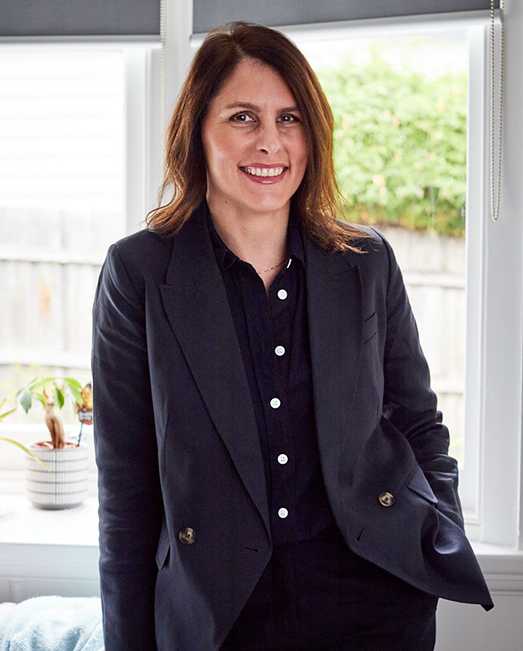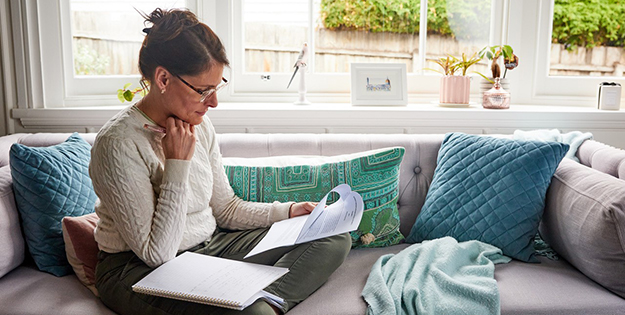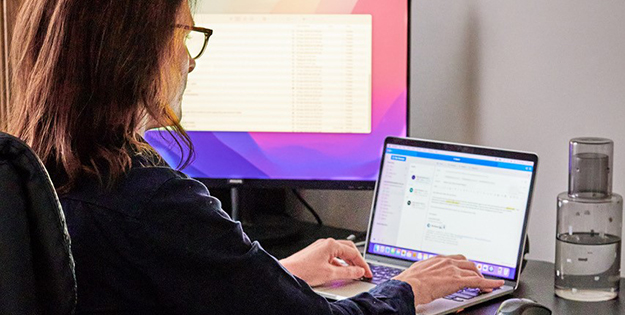Career
Copyright@ Australian Catholic University 1998-2026 | ABN 15 050 192 660 CRICOS registered provider: 00004G | PRV12008
Copyright@ Australian Catholic University 1998-2026 | ABN 15 050 192 660 CRICOS registered provider: 00004G | PRV12008

Jacqueline Russell was committed to getting her career back on track after having three children. She carved out 10 hours each week after the kids were in bed to study occupational health, safety and environmental management and now runs her own consultancy.
Jacqueline appreciates structure. You might expect that of a woman who started studying online at ACU in 2013 while working full-time, teaching dance classes, raising three young children, and coordinating the renovation of a heritage home. And she aimed for distinctions the whole way.
Many late nights later and Jacqueline’s occupational health, safety and environmental management qualification has allowed her to do for others what she does best: create a framework for success.
We spoke with her about her journey.
You studied a Graduate Certificate then Graduate Diploma in Occupational Health, Safety and Environmental Management online at ACU. Why did you choose this field?
“I was slowly returning to work after having my kids and I was working as an office manager for a building firm. I was also running my own business as a dance instructor, which I still run. My background is in quality management though and I wanted to get back into it.
“The last role I had before children was as a quality manager with a large corporation, and it always incorporated the OHS and the environmental sides. I didn’t have qualifications in those areas, so I thought I’d study those while I was job hunting and it would add to my credentials and potentially be something worth pursuing later.”
How was your experience of studying online?
“Studying online does take a lot of self-motivation and organisational skills, but I absolutely loved it. It gave me the flexibility I needed, my course was well established and well structured, there were clear and concise modules for each topic, and it was very easy to navigate the online portal.
“I structured my learning based on the recommended time for each module and the scheduled assessments. I could see when the assessments were due, and the modules being assessed. We were able to connect with our tutor and other students online if we needed assistance, and there was clear, concise instruction of what was happening during the semester or in the subject.”

What were the highlights of your ACU course?
“I enjoyed submitting assignments and getting feedback. When you’re a mature-age student, you go in with a little more excitement to learn. I had already been there and done a lot in the quality, safety and environmental management field, so when I put to paper what I’d learnt – in the modules and in life – it was good to read feedback from your lecturer and know you’re on the right track.
“I always wanted to master my work and aimed for distinctions. With my workload I couldn’t always put as much effort in, so when I got a credit, I would read the feedback and really take it on board.”
How did you squeeze your studies into your busy schedule?
“I really wanted to study because I knew it would make me feel more comfortable when I did apply for a role. But my studies had to fit around my work, my business and my three children: two in primary school and one in kindergarten. I thought, ‘How am I going to do this? My husband travels, so I can’t call on him to take on anything else other than the bare minimum, we have no family in Melbourne – so if it’s meant to be it’s up to me.’
“I worked out I could dedicate 10 hours to studying a week. If it was at 3am, I’d fit it in. You just do what it takes if it’s something you want to do. And I don’t like starting something I won’t finish.”
You studied part-time for four years. Did you continue to work full-time?
“Yes. That’s why the online mode was great: we had modules so we could study in short bursts. I would come home and if it was after, say, basketball training on a Thursday night, I knew that after I fed everyone and put them to bed, I had the next three hours of my time free. I studied predominantly at night-time and sometimes on the weekend.
“The formal dining area became my place where I’d sit and shut the doors. The kids would be in bed at 9.30pm and my husband knew that, when the doors were shut, I was not to be disturbed. You need to find a space that’s uncluttered, stick to it, and make sure the people around you honour and respect that.”
What were the biggest challenges?
“Making sure that, when I committed to studying at certain times, I followed through. Aside from work commitments and raising the kids, my husband and I were busy planning and organising the renovation of our heritage home. It was a major juggling act at times and quite stressful. Some days were hard to focus on study, but I reminded myself to keep going and finish what I had started.
“I also found it challenging from an IT perspective. That is, making sure the wi-fi was working smoothly for exams and that my computer battery was not going to die – all those elements that online learning brings.”

What work do you do now, and what impact have your studies had on your career?
“After finishing my course, I maintained part-time work with the building firm as Office Manager. I also started my own management consulting business, contracting my services to organisations across multiple industries, such as medical, police force, defence force, software development, manufacturing, and aged and disability care facilities.
“I build single and integrated quality, safety and environmental management systems to ISO standards for my clients, conduct internal audits to monitor their operations in accordance with the standards, and support them through their certifications and surveillance audits.
“Some of my clients will have an existing system of their own and I’ll work with them to improve it for their specific needs. I also coach my clients, so they understand what standards they need to meet and why. Many organisations that need a quality, safety and environmental management system can’t operate without a certification, but they don’t necessarily know what they’re signing up for. My focus is to provide my clients with a system that is personalised to their business operations, and that they can understand and confidently manage to meet ISO standards.”
What is the best part of your job?
“Interacting with other people, learning about how different organisations operate, and helping them with the OHS, environment and quality side. I thoroughly enjoy educating people about that and how meeting standards helps businesses succeed.
“People want ISO certification to add value to their business, but they don’t necessarily see the value until they win a tender or new business, for example, and start seeing the value in their bottom line. That’s when organisations start to understand what the framework does, and how it brings value to the business by creating continuity and continual improvement and structure.”
If you want flexible study options that take you places, explore our ACU Online courses.
Copyright@ Australian Catholic University 1998-2026 | ABN 15 050 192 660 CRICOS registered provider: 00004G | PRV12008